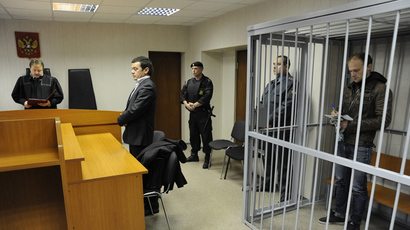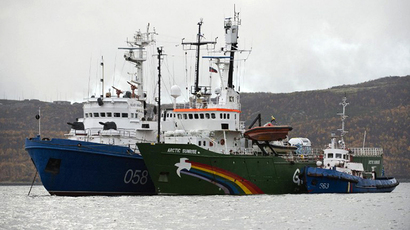Suspected drugs aboard Greenpeace Arctic Sunrise ship - Russian investigators

Narcotic substances, presumed to be poppy straw and morphine, have been confiscated from the Greenpeace ship Arctic Sunrise, a spokesman for the Russian Investigative Committee declared Wednesday.
"The detectives and
criminal experts jointly with specialists in concrete spheres are
examining the documents, objects and equipment, which were
confiscated during the search on board the ship Arctic Sunrise.
They have already found that some part of confiscated equipment
is of dual purpose and could have been used not only in
ecological purposes," the Investigative Committee said. This
will undergo specific legal expertise, which the detectives plan
to conduct soon.
The Investigative Committee’s
spokesman, Vladimir Markin, said in a statement published on its
website that “narcotic substances (probably poppy straw and
morphine) were confiscated during the search on the ship.”
“The origin of these
substances and their purpose are being investigated as well,"
the statement said.
Given this “new
evidence,” the charges already brought against the 30
Greenpeace activists could be “modified,” the
Investigation Committee said.
Russian investigators will
also charge some of the Arctic Sunrise crewmembers with further
serious crimes, as they are suspected of ramming border guards’
boats, endangering the guards’ lives and health, the
Investigative Committee’s statement said.
We assume the Russian claims of drugs found on ship refer to the medical supplies we are obliged to carry under maritime law.
— Arctic Sunrise (@gp_sunrise) October 9, 2013
Poppy straw, the husk left
after the opium is extracted from the pods, is a raw material
that can be used for illegally producing heroin or morphine.
Recognized as a narcotic substance, the possession, sale, purchase or use of poppy straw without a license or authorization is against Russian law.
Greenpeace has called Russia’s
claims that illegal drugs were found on board the ship “a
fabrication, pure and simple.”
“Before leaving Norway for the Russian Arctic, the ship was
searched with a sniffer dog by the Norwegian authorities, as is
standard. The laws in Norway are amongst the strictest in the
world, and nothing was found because nothing illegal was on the
ship,” Greenpeace said in a statement posted on its website.
Greenpeace International responds to the Russian Investigative Committee's latest allegations http://t.co/6CjVm9rOv6 via @Greenpeace
— Greenpeace PressDesk (@greenpeacepress) October 9, 2013
Greenpeace said that
“certain medical supplies” are kept on board all of its
ships, in accordance with maritime law, and “only the captain
and the doctor have access to [them].”
All 30 of the participants in
the Greenpeace protest, from 18 different countries, are being
held in pre-trial detention and last week were charged with
piracy following their protest at Gazprom’s Prirazlomnaya oil
platform earlier this month. According to Russian law, the
charge of piracy carries a maximum penalty of up to 15 years in
prison.
On Oct. 4, the Netherlands
filed a lawsuit against Russia in an
international maritime court in a bid to win the release of the
Dutch-registered Greenpeace vessel Arctic Sunrise and its 30
crewmembers.
In response, Russia’s Foreign Ministry criticized Dutch authorities for not
intervening in the situation earlier, as “over the last year
and a half the Russian side made repeated attempts” to draw
the attention of the Dutch government to “the vessel’s illegal
activities.”
The executive director of
Greenpeace International, Kumi Naidoo, has appealed to President
Vladimir Putin, requesting “an urgent meeting.”
“I would of course be willing to meet you anywhere in the world,
in a place of your choosing, but I ask that if possible our
meeting is held at your earliest convenience in Russia,”
Naidoo wrote in an open letter to Putin.
Naidoo offered himself “as a guarantor for the good conduct of
the Greenpeace activists, were they to be released on bail,”
saying he is willing to move his life “to Russia for the
duration of this affair.”
The Greenpeace
activists’ detention in Russia has sparked a massive reaction
among the group’s supporters and human rights organizations.
Greenpeace called a worldwide day of solidarity Saturday, with
protests in 170 locations across 45 countries.

















